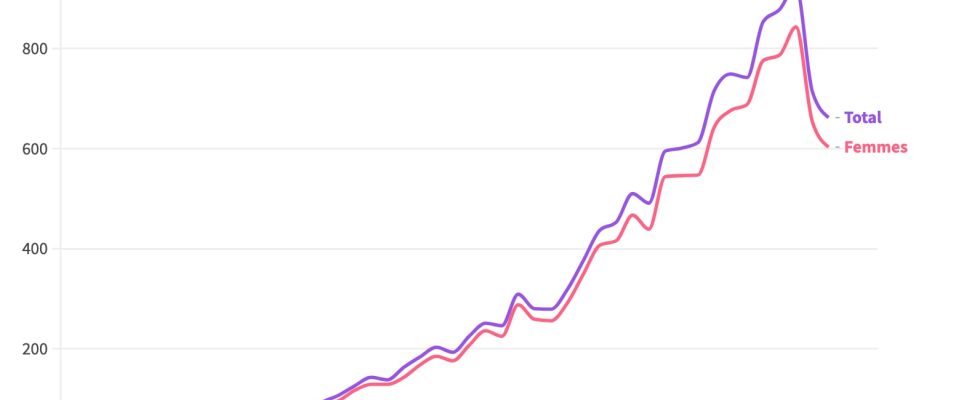This is an article from the National Institute of Demographic Studies (INED) which confirms the significant increase in life expectancy in France. In this study published in the magazine Population and Societies of April, the authors assure us: the increase in the number of centenarians since the end of the Second World War is “spectacular”. From around a hundred in 1900 or nearly 200 in 1950, their number increased to more than 1,000 in 1970, then to more than 8,000 in 2000.
An increase which is far from slowing down since, with a fourfold increase in the number of centenarians in France over the last twenty-five years, which exceeded 31,000 on January 1, 2024. “Under the hypothesis of a continuation of current trends of mortality, INSEE projects more than 200,000 centenarians in 2070”, points out the study, recalling that while “only 0.02% of people born in 1850 became centenarians, this proportion rises to 2% for the 1920 generation, a 100-fold increase in the probability of reaching 100 years old”, we also learn.
Female overrepresentation
More particularly, the researchers were interested in the age group over 105, which has also been increasing in recent years. Their number was thus estimated at nearly 2,000 on January 1, 2023, recalls INED, or the number of centenarians in France in 1981.
To be able to study this evolution more precisely, the INED study was based in particular on the evolution of mortality over the age of 105 in France. Figures reported by theInternational Database on Longevitya group of international researchers who are working to collect this data in several Western countries, and who in France are based on data from INSEE.
The conclusion is clear: while the number of deaths per year of people over 105 did not exceed a hundred before the 1990s, this number has only gradually increased over the years. Even approaching 1,000 deaths per year at the turn of the 2020s. “Of course this number is still insignificant (less than 0.15%) compared to the more than 600,000 deaths observed each year in France but its explosion is spectacular”, conclude the INED researchers.
The other observation concerns the overwhelming over-representation of women in these mortality figures. Thus, in 2020, of the 924 people over the age of 105 who died, there were 843 women for 81 men, a ratio of more than 1 to 10. “This impressive ratio is entirely due to excess male mortality, which prevails throughout the throughout life, particularly at working ages, and which further reduces the number of male generations compared to their female counterparts”, explains the study.
Finally, regarding the decline in recent years, since the peak in 2020, the answer is not to be found in a possible relapse, but in “the arrival at this age of the hollow classes born during the First World War”, with a collapse in births between 1915 and 1919 which has repercussions today, explains INED
The longevity revolution
INED researchers nevertheless concede: if this study makes it possible to validate an increase in “extreme ages reached by a few individuals”, it does not yet make it possible to refine “the estimates of the risks of death at very old ages”. In other words, the sample remains too insufficient for the moment to be able to draw real conclusions on the mortality rates of people aged over 100, and in particular for those over 105.
“At these advanced ages, the numbers of observations still remain insufficient to resolve the debate between those in favor of a continuation of the exponential increase in mortality with age, as observed at younger ages, and those in favor of the hypothesis of a slowdown in the increase or even stagnation leading to a plateau in mortality”, concludes the team of researchers.
L’Express, for its part, devoted a large article last December to the ongoing scientific revolution on longevity. Clinical trials to slow down aging, massive investments by rich biotech companies who want to “kill death”, brain rejuvenation: living to the age of 120 will perhaps soon no longer be a mirage. The mortality figures for centenarians in the 2020s may soon be nothing more than distant memories.
